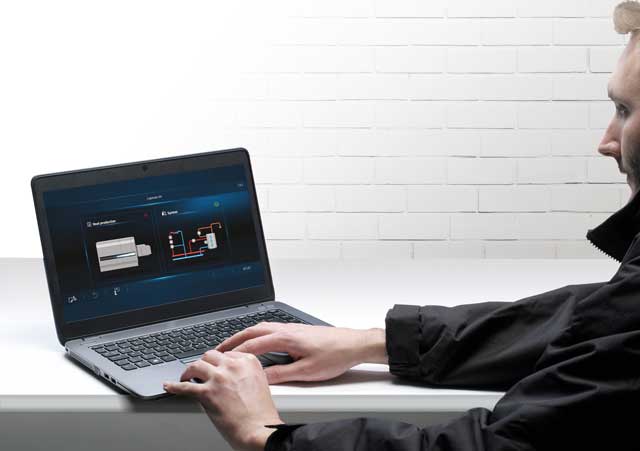 Internet-connected commercial boiler controls have long been seen as the next step in plant room operation and management. Following the launch of the first control of its type Pete Mills, technical operations manager at Bosch Commercial and Industrial, discusses the role remote operation will play.
Internet-connected commercial boiler controls have long been seen as the next step in plant room operation and management. Following the launch of the first control of its type Pete Mills, technical operations manager at Bosch Commercial and Industrial, discusses the role remote operation will play.
Plant managers are faced with the challenge of recommending and installing heating and hot water systems which have the ability to maximise efficiency. This requirement extends beyond saving on utility bills to limiting the number of site visits and even reducing equipment downtime.
Until recently, the only way of providing remote monitoring and operation of a building’s heating was through an intelligent building management system (BMS). Though the incorporation of BMS has become the norm for those operating large estates and buildings, the added cost and complexity has dissuaded managers responsible for smaller plants. Even for larger organisations, gaps can appear, with boiler rooms that are either not covered by, or easily incorporated into, an existing BMS.
Remote monitoring and operation as standard
The primary benefit of the new generation of internet-connected heating controls is the ability to operate and monitor commercial heating systems remotely. Intuitive web-based systems allow facilities managers to access their own secure platform and monitor a system’s performance data via tablet, PC or laptop.
Having easy access to historical warnings and faults can save significant time when troubleshooting complex systems such as heating systems. At the same time, having the ability to tweak heating programmes and temperatures gives managers the tools to make adjustments that help keep on top of energy use.
Such holistic systems bring with them the potential to effectively monitor more than one site. Managers are increasingly tasked with overseeing several sites, sometimes miles apart. Intelligent systems allow users to remotely access an overview of all their sites from a convenient dashboard. This cuts down not only the time spent at each site, but also travel between sites, which can be a difficult cost to account for.
Reducing equipment downtime
Internet-connected controls can allow performance shortfalls to be clearly monitored. This ultimately creates opportunities for equipment to be repaired in anticipation of, rather than in response to, a breakdown. Maintenance systems can provide support by offering warnings on equipment. In the past, system warnings rarely provided a specific prognosis. However, the latest control systems allow managers to delve into a monitoring platform to identify the specific issue and see whether action has been taken in response to the alert. Both the manufacturer and the facilities manager can have access to important maintenance information, such as when the next service is due.
Payback potential
As well as limiting downtime, internet-connected controls have a positive impact on lifetime costs, because making changes no longer involves someone going to site. Instead, changes to many of the key setpoints can be done from the convenience of an internet connected browser, from an office. This means changes are not put off and can be acted upon promptly. Internet-connected commercial boiler controls have the ability to significantly reduce the number of staff hours spent visiting plant rooms, while improving boiler efficiency and reducing maintenance costs.
Small sites can benefit
For operators of smaller sites, intelligent controls can present a cost-effective alternative to BMS, as well as filling any gaps for those managing larger estates. For the first time this brings internet connectivity within the budgets of even the simplest commercial boiler rooms and, since control systems are often replaced alongside boilers, this can be an unexpected bonus.
The first internet-connected commercial boiler control, the Control 8000, was launched by Bosch Commercial and Industrial earlier this year. To find out more visit: bit.ly/Control8000.

